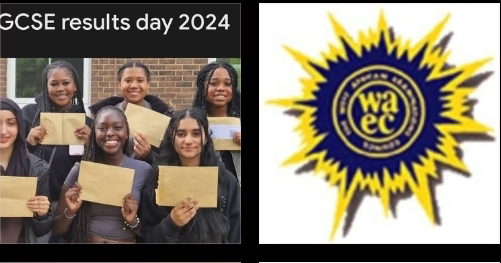WAEC vs. GCSE Results: A Comparative Analysis of Nigeria and the UK’s Education Systems
The release of exam results is a significant milestone for students around the world, marking the culmination of years of hard work and preparation. In Nigeria and the UK, two of the most recognized secondary school examination systems— the West African Senior School Certificate Examination (WASSCE) administered by WAEC and the General Certificate of Secondary Education (GCSE)—have seen contrasting outcomes, sparking debates on the quality and integrity of these educational assessments.
Celebration in Nigeria vs. Disappointment in the UK
In Nigeria, the recently released WAEC results have been a cause for celebration among many students and their families. Reports show a large number of students achieving A grades across most, if not all, of their subjects. These results are often seen as a testament to the students' hard work and the quality of education they receive.
In contrast, the GCSE results in the UK have not sparked the same level of enthusiasm. Many students in the UK are finding that achieving top grades has become increasingly challenging. The 2024 GCSE results, like those in the past three years, have seen a decline in the number of top grades awarded. This has led to concerns about the academic pressure on students and questions about the fairness of the grading system.
Perception of Education Standards: Nigeria vs. UK
The stark contrast between the celebratory mood in Nigeria and the more subdued reaction in the UK has fueled debates about the relative standards of education in both countries. It is a common perception that the UK maintains higher educational standards compared to Nigeria. The GCSE is often viewed as a rigorous and comprehensive assessment, designed to test students' critical thinking and understanding across various subjects. On the other hand, the WAEC exams in Nigeria are sometimes criticized for being more lenient, with some observers alleging that high grades are more easily attainable.
However, the recent results challenge this narrative. The abundance of A grades in Nigeria could suggest that students are performing exceptionally well, but it also raises questions about the integrity of the examination process.
The Issue of 'Miracle Centers' in Nigeria
One significant issue affecting the credibility of WAEC results in Nigeria is the existence of so-called "miracle centers." These are examination centers where candidates reportedly receive undue assistance during their exams, often in the form of leaked answers or even having the exams written for them. The term "miracle center" reflects the idea that students can achieve miraculous results—often far above their actual academic abilities—through illicit means.
The proliferation of these centers has been a point of concern for years, with many arguing that they undermine the value of the WAEC certificate. If a student can achieve multiple A grades through dishonest means, it calls into question the legitimacy of the entire examination system. This situation contrasts sharply with the UK, where strict examination protocols and a culture of academic integrity make such widespread cheating much less likely.
Post-COVID-19 Exam Trends in Nigeria and the UK
The COVID-19 pandemic has had a profound impact on education systems worldwide, and both Nigeria and the UK are no exceptions. The past three years of exam results offer a window into how each country has adapted to the challenges posed by the pandemic.
Nigeria: WAEC Results Post-Pandemic
In Nigeria, the post-pandemic WAEC results have generally shown an upward trend in the number of students achieving high grades. For instance, in 2021, the first year after the height of the pandemic, there was a significant increase in the pass rate, with over 80% of candidates earning credits in at least five subjects, including Mathematics and English. This trend continued in 2022 and 2023, with the percentage of students achieving top grades steadily rising.
However, these results have not been without controversy. Critics argue that the pressure to maintain high pass rates has led to a lowering of standards, with some schools and examination centers allegedly resorting to unethical practices to boost their students' results.
UK: GCSE Results Post-Pandemic
In the UK, the impact of the pandemic on GCSE results has been markedly different. The 2020 and 2021 exams saw an unprecedented situation where grades were awarded based on teacher assessments rather than formal exams. This led to a significant increase in the number of top grades, with nearly 30% of students achieving A/7 or above.
However, as the UK returned to more traditional exam formats in 2022 and 2023, the percentage of top grades dropped. In 2023, for example, only 22% of students achieved top grades, down from the pandemic high. This decline has been attributed to a recalibration of the grading system, aimed at restoring pre-pandemic standards and ensuring that the qualifications remain rigorous and respected.
The Broader Implications
The contrasting experiences of students in Nigeria and the UK highlight the complexities of educational assessments and the challenges of maintaining standards in the face of external pressures. While Nigerian students have much to celebrate, the integrity of the WAEC exams is under scrutiny. In the UK, the emphasis on maintaining high standards has led to a tougher grading regime, leaving many students feeling disappointed despite their hard work.
Conclusion
As educators, policymakers, and stakeholders in both countries continue to grapple with these issues, it is clear that a balance must be struck between rewarding students' efforts and maintaining the credibility of the examination systems. For Nigeria, this might mean taking stronger actions against the malpractice associated with "miracle centers" and ensuring that high grades truly reflect a student's abilities. In the UK, it could involve finding ways to support students better without compromising on the rigour of the exams.
The recent WAEC and GCSE results are more than just a reflection of student performance—they are a mirror of the challenges and opportunities facing education systems in a post-pandemic world.




Comments
Post a Comment